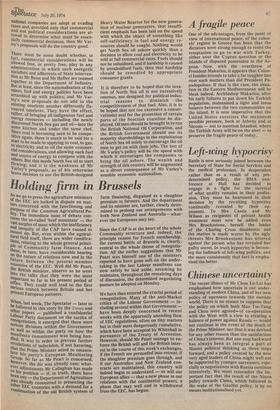Holding firm in Brussels
As we go to press the agriculture ministers of the EEC are locked in dispute on matters concerned with the functioning and purpose of the Common Agricultural Policy. The immediate issue of debate concerns the so-called 'beef mountain' — the vast surplus of meat which the inefficiency and inequity of the CAP have caused to mount up. But, even within the agricultural field itself, there are wider ramifications, relating to the whole general princi ple of Community farm finance. And these, in turn, have considerable bearing on the nature of relations now and in the future between the present member countries of the EEC. Well did Mr Peart, the British minister, observe as he went into the talks that they were the most lialportant so far in his present period of Office. They could well lead to the first serious crunch between Britain and her Present European partners.
When, last week, The Spectator — later to be followed in this story by the Times and Other papers — published a confidential Labour Party document on the tactics of renegotiation, it emerged that there were serious divisions within the Government as well as within the party on how the manifesto commitment was being handled. It was in order to prevent further revelations of indecision, if not havering, that the Prime Minister acted to emasculate his party's European Monitoring ,Grbul). So far as Mr Peart is concerned, however, the die was already cast: whatever adjustments Mr Callaghan has made to his position — if, in truth, there have been any — the Department of Agriculture Was already committed to presenting the Other EEC countries with a demand for a continuation of the old British system of farm financing, disguised as a slaughter premium to farmers. And the department and its minister are, further, clearly determined to prolong our arrangements with both New Zealand and Australia —whatever the Europeans may say.
Since the CAP is at the heart of the whole Community structure and, indeed, the principle reason for French membership, the current battle of Brussels is, clearly, central to the whole theme of renegotiation. All the earlier suggestions that Mr Peart was himself one of the ministers reported to have gone soft on the undertaking in the last Labour manifesto can now safely be laid aside, assuming he maintains, throughout the remaining days of discussion, the determined negotiating posture he adopted on Monday.
We have thus entered the crucial period of renegotiation. Many of the anti-Market critics of the Labour Government — including several within that Government — have been deeply concerned in recent weeks with the apparently unending flow of EEC regulations, often on tiny matters but in their mass dangerously cumulative, which have been accepted by Whitehall in pursuance of the Treaty of Accession. However, should Mr Peart manage to enforce the British will and the British interest in the course of this week's exchanges, if the French are persuaded into retreat, if the slaughter premium goes through, and if our Australian and New Zealand contracts are maintained, this country will indeed begin to understand — as will our European allies — that a new phase in our relations with the continental powers, a phase that may well end in withdrawal from the EEC, has begun.


































 Previous page
Previous page